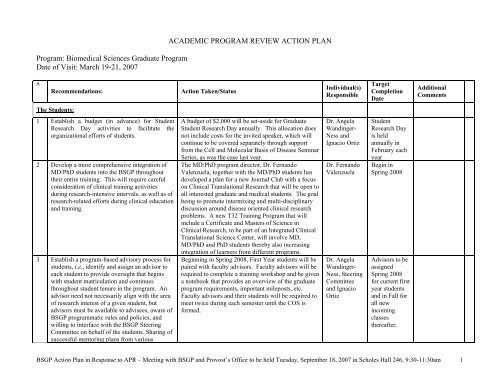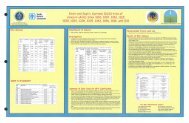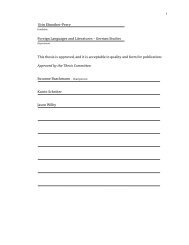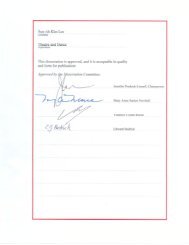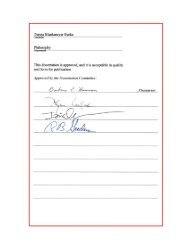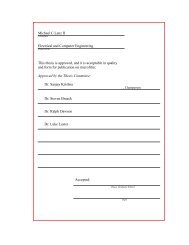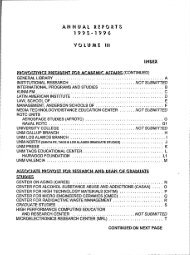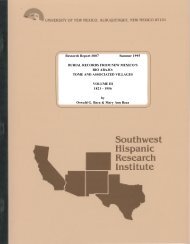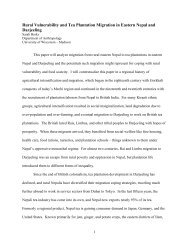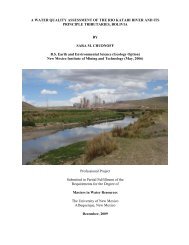You also want an ePaper? Increase the reach of your titles
YUMPU automatically turns print PDFs into web optimized ePapers that Google loves.
Program: Biomedical Sciences Graduate Program<br />
Date of Visit: March 19-21, 2007<br />
#<br />
Recommendations: <strong>Action</strong> Taken/Status<br />
The Students:<br />
1 Establish a budget (in advance) for Student<br />
Research Day activities to facilitate the<br />
organizational efforts of students.<br />
2 Develop a more comprehensive integration of<br />
MD/PhD students into the <strong>BSGP</strong> throughout<br />
their entire training. This will require careful<br />
consideration of clinical training activities<br />
during research-intensive intervals, as well as of<br />
research-related efforts during clinical education<br />
and training.<br />
3 Establish a program-based advisory process for<br />
students, i.e., identify and assign an advisor to<br />
each student to provide oversight that begins<br />
with student matriculation and continues<br />
throughout student tenure in the program. An<br />
advisor need not necessarily align with the area<br />
of research interest of a given student, but<br />
advisors must be available to advisees, aware of<br />
<strong>BSGP</strong> programmatic rules and policies, and<br />
willing to interface with the <strong>BSGP</strong> Steering<br />
Committee on behalf of the students. Sharing of<br />
successful mentoring plans from various<br />
ACADEMIC PROGRAM REVIEW ACTION PLAN<br />
A budget of $2,000 will be set-aside for Graduate<br />
Student Research Day annually. This allocation does<br />
not include costs for the invited speaker, which will<br />
continue to be covered separately through support<br />
from the Cell and Molecular Basis of Disease Seminar<br />
Series, as was the case last year.<br />
The MD/PhD program director, Dr. Fernando<br />
Valenzuela, together with the MD/PhD students has<br />
developed a plan for a new Journal Club with a focus<br />
on Clinical Translational Research that will be open to<br />
all interested graduate and medical students. The goal<br />
being to promote intermixing and multi-disciplinary<br />
discussion around disease oriented clinical research<br />
problems. A new T32 Training Program that will<br />
include a Certificate and Masters of Science in<br />
Clinical Research, to be part of an Integrated Clinical<br />
Translational Science Center, will involve MD,<br />
MD/PhD and PhD students thereby also increasing<br />
integration of learners from different programs.<br />
Beginning in Spring 2008, First Year students will be<br />
paired with faculty advisors. Faculty advisors will be<br />
required to complete a training workshop and be given<br />
a notebook that provides an overview of the graduate<br />
program requirements, important mileposts, etc.<br />
Faculty advisors and their students will be required to<br />
meet twice during each semester until the COS is<br />
formed.<br />
Individual(s)<br />
Responsible<br />
Dr. Angela<br />
Wandinger-<br />
Ness and<br />
Ignacio Ortiz<br />
Dr. Fernando<br />
Valenzuela<br />
Dr. Angela<br />
Wandinger-<br />
Ness, Steering<br />
Committee<br />
and Ignacio<br />
Ortiz<br />
Target<br />
Completion<br />
Date<br />
Student<br />
Research Day<br />
is held<br />
annually in<br />
February each<br />
year<br />
Begin in<br />
Spring 2008<br />
Advisors to be<br />
assigned<br />
Spring 2008<br />
for current first<br />
year students<br />
and in Fall for<br />
all new<br />
incoming<br />
classes<br />
thereafter.<br />
Additional<br />
Comments<br />
<strong>BSGP</strong> <strong>Action</strong> <strong>Plan</strong> in Response to <strong>APR</strong> – Meeting with <strong>BSGP</strong> and Provost’s Office to be held Tuesday, September 18, 2007 in Scholes Hall 246, 9:30-11:30am 1
departmentally-based efforts could facilitate a<br />
thoughtful programmatic solution.<br />
4 Establish a long-range plan for defining the<br />
optimum size and expansion of the program<br />
commensurate with faculty size and funded<br />
research programs. This planning will require<br />
careful consideration of important fiscal<br />
constraints associated with student recruitment<br />
and 1 st year stipend support, as well as<br />
mechanisms to sustain matriculated students if<br />
research funding is lost<br />
The Curriculum<br />
1 A process for the regular review/revision of the<br />
entire <strong>BSGP</strong> curriculum is essential. The<br />
external reviewers suggest establishment of a<br />
Curriculum Subcommittee consisting of<br />
members from the 6 academic <strong>BSGP</strong> research<br />
divisions and the extramural partners (LRRI and<br />
LANL). This subcommittee should be charged<br />
with performing regular reviews of the core<br />
courses and selectives to ensure that these<br />
offerings are meeting the needs of <strong>BSGP</strong><br />
students. In this process, involvement and/or<br />
input of students from each of the <strong>BSGP</strong><br />
research divisions is critical. Recommendations<br />
from the Subcommittee would then provide a<br />
basis for further consideration by the <strong>BSGP</strong><br />
Steering Committee.<br />
2 The manner in which the qualifying and<br />
comprehensive exams are administered should<br />
be carefully reviewed to ensure that all<br />
committees incorporate rigor in both<br />
examinations. Steps should be taken to ensure<br />
that the format of the comprehensive<br />
The SOM engaged in a strategic planning process<br />
approximately 4 years ago in which it was decided<br />
that the focus of the <strong>BSGP</strong> should be on recruitment<br />
and improving the quality of our students (currently,<br />
14-20 new PhD students per year). Additional funds<br />
were committed to recruitment and enhancing <strong>BSGP</strong><br />
staff. At that time, it was agreed that the class size<br />
should be examined in a second phase. As a result,<br />
we will engage in a process in 2008 that will give<br />
careful consideration to appropriately sizing the <strong>BSGP</strong><br />
class in relation to the research enterprise. This<br />
process will be started by an ad hoc committee<br />
established by the Sr. Associate Dean for Research in<br />
consultation with the Assistant Dean for Graduate<br />
Studies. After feedback from our Research Strategic<br />
<strong>Plan</strong>ning Committee, the plan will be presented to the<br />
Dean of the SOM for consideration.<br />
A faculty subcommittee consisting of <strong>BSGP</strong> Steering<br />
Committee members, <strong>BSGP</strong> course directors and the<br />
Assistant Dean of Graduate Studies has been<br />
established to address two issues: a) establish a<br />
process for regular curriculum review and<br />
incorporation of new courses; b) identify the key<br />
curricular needs. The directors of a MS in Clinical<br />
Research and of an interdisciplinary, NSF-funded<br />
IGERT program have also been asked to provide<br />
input. Student input will be solicited through small<br />
focus groups.<br />
The qualifying exam has been carefully reviewed.<br />
Revised guidelines for student evaluation were<br />
implemented with the May 2007 exam and positively<br />
received by examiners and students. The exam<br />
process and guidelines have been clearly articulated in<br />
written form and together with the evaluation form are<br />
Drs. Larson<br />
and<br />
Wandinger-<br />
Ness<br />
Drs.<br />
Hathaway,<br />
Ness,<br />
Partridge,<br />
Oliver,<br />
Wandinger-<br />
Ness, BSGSS<br />
appointees<br />
Qualifying<br />
Exam Chair<br />
(TBA) and<br />
Program<br />
Director<br />
(AWN)<br />
Negotiations<br />
for<br />
departmental<br />
scholars for the<br />
following Fall<br />
term should<br />
begin in<br />
January and<br />
MOUs should<br />
be in place by<br />
January 31<br />
each year.<br />
Completed Bi-<br />
Annually, first<br />
review/revision<br />
to be<br />
completed by<br />
Spring 2008<br />
Complete<br />
(with the<br />
exception of<br />
identifying a<br />
Qualifying<br />
Exam Chair)<br />
<strong>BSGP</strong> <strong>Action</strong> <strong>Plan</strong> in Response to <strong>APR</strong> – Meeting with <strong>BSGP</strong> and Provost’s Office to be held Tuesday, September 18, 2007 in Scholes Hall 246, 9:30-11:30am 2
examination is consistent among all students posted on the web. The Assistant Dean for Graduate<br />
Studies and the Qualifying Exam Chair will continue<br />
to provide a prep session two-three weeks in advance<br />
of both the January and May exam periods. The<br />
comprehensive exam guidelines are posted on the<br />
webpage and the program office will ensure that<br />
examiners and students are apprised of the exam<br />
timelines and requirements. A plan for formalized<br />
training of all mentors will also help ensure greater<br />
3 A multidisciplinary course on the Responsible<br />
Conduct of Research should be provided on an<br />
annual basis and be required for every <strong>BSGP</strong><br />
student. In this course, the participation of<br />
representative faculty from each of the research<br />
divisions would be extremely beneficial.<br />
4 Students should receive information and engage<br />
in discussions about alternative careers in<br />
science<br />
uniformity.<br />
Drs. Hjelle and Wandinger-Ness have taught an<br />
existing course on Responsible Conduct in Research<br />
since 2000 on a biannual basis. Discussions are in<br />
progress among Dept. Chairs to identify additional<br />
faculty who could participate in the teaching of this<br />
course every semester to allow more students to be<br />
served. Our current practice within the SOM is to<br />
charge the department that directs the course with<br />
leading the effort to assign directorship and find<br />
faculty. The pool of faculty to be asked to participate<br />
in teaching the course includes current training grant<br />
directors and mentors with training grant supported<br />
students. This positions the <strong>BSGP</strong> to require ethics<br />
training of all students beginning Fall 2008.<br />
Biomedical Graduate Student Society has taken the<br />
lead in inviting speakers (3-4/year) to discuss various<br />
career tracks at an annual retreat held in September<br />
each year. Speakers in the past three years have<br />
covered careers in science writing, as administrators<br />
in private science foundations, in pharmaceutical<br />
industry, among others. The retreat is open to all<br />
graduate students and postdoctoral fellows.<br />
In addition, a new monthly series on career<br />
development and career options will be developed<br />
and integrated with similar efforts in the Clinical<br />
Translational Science Center (CTSC) and College of<br />
Pharmacy (COP). A faculty leader for this initiative<br />
needs to be identified.<br />
Drs. Brian<br />
Hjelle and<br />
Mary<br />
Lipscomb<br />
BSGSS and<br />
faculty leader<br />
TBA<br />
reviewed again<br />
Bi-Annually<br />
Scheduled for<br />
Fall 2007 and<br />
will be offered<br />
each semester.<br />
Retreat<br />
scheduled for<br />
September 14,<br />
2007 at the<br />
Hispanic<br />
Cultural Center<br />
Dr. Bill Gannon<br />
has agreed to be<br />
the course<br />
director this<br />
semester as a 7<br />
week, 1 credit<br />
hour course. Dr.<br />
Mary Lipscomb<br />
is interested in<br />
being Course<br />
Director in the<br />
future.<br />
<strong>BSGP</strong> <strong>Action</strong> <strong>Plan</strong> in Response to <strong>APR</strong> – Meeting with <strong>BSGP</strong> and Provost’s Office to be held Tuesday, September 18, 2007 in Scholes Hall 246, 9:30-11:30am 3
The Faculty<br />
1 The Program Director needs to ensure that<br />
faculty are better informed about program<br />
requirements, particularly those concerning the<br />
comprehensive exam. This could take the form<br />
of scheduled sessions in departmental faculty<br />
meetings, though there could be many<br />
alternative strategies.<br />
2 The School of Medicine and/or the OGS needs<br />
to better monitor and credit faculty effort in<br />
graduate education, similar to that which is<br />
apparently already in place for crediting faculty<br />
effort in medical professional education. The<br />
departmental and school administration need to<br />
recognize the value of faculty efforts in both<br />
formal lecture hours and less formal, but equally<br />
important, individual mentoring of graduate<br />
students. The School should recognize that<br />
faculty efforts in graduate education are of<br />
comparable value to that of medical education<br />
for a Tier 1 research institution.<br />
A faculty training workshop has been developed and<br />
was first offered in Fall 2006. Several workshops will<br />
be run in September and October 2007. Faculty<br />
attending the workshop receive a handbook that<br />
includes information about program requirements,<br />
mileposts, etc. and mirrors information given to all<br />
entering students. In addition, all student handbook<br />
information is regularly updated and posted on the<br />
<strong>BSGP</strong> webpage. Senior Associate Dean for Research,<br />
Dr. Richard Larson, at the direction of Dr. Paul Roth,<br />
Dean of SOM, will require all prospective mentors to<br />
complete the training workshop. Mandatory training<br />
may also be tied to requests for approval as graduate<br />
training faculty (by the <strong>BSGP</strong> and OGS), renewable<br />
every 5 years.<br />
An Ad-Hoc Committee with representation from each<br />
department involved in graduate education within the<br />
School of Medicine has been formed to address this<br />
issue. The committee has met and established a rough<br />
guideline of what activities need to be captured, how<br />
they should be valued across departments, and how<br />
they will be reported within the <strong>BSGP</strong> structure and in<br />
the Faculty Activity Database (FAD) with SOM<br />
Administration. Based on the committee’s proposals<br />
to Dr. Larson and the Department Chairs, SOM has<br />
adopted a mechanism whereby the <strong>BSGP</strong> staff will<br />
track faculty effort and report in accordance with the<br />
FAD timelines (6 month increments). This will be<br />
reviewed during the mid-year budget review and<br />
treated equally to all other SOM education activities.<br />
The committee will continue to meet and revise the<br />
proposal of this tracking mechanism and align the<br />
collection, valuation and reporting as closely as<br />
possible with professional medical education tracking<br />
and reporting. The committee's proposals will<br />
be shared with the chairs of each department for input<br />
and approval. The goal is to bring equal recognition<br />
and distribution of faculty effort in clinical and<br />
graduate research education and training.<br />
Ignacio Ortiz;<br />
<strong>Plan</strong> for<br />
required<br />
faculty mentor<br />
training<br />
discussed with<br />
Chairs and<br />
<strong>BSGP</strong> steering<br />
committee<br />
Drs. Larson,<br />
Wandinger-<br />
Ness, Griffith<br />
and Ignacio<br />
Ortiz<br />
Training will<br />
be offered in<br />
Mid September<br />
and Early<br />
October<br />
Initialized July<br />
2007<br />
A training will<br />
also be offered<br />
off-site at LRRI<br />
for the mentors<br />
at that research<br />
facility.<br />
<strong>BSGP</strong> <strong>Action</strong> <strong>Plan</strong> in Response to <strong>APR</strong> – Meeting with <strong>BSGP</strong> and Provost’s Office to be held Tuesday, September 18, 2007 in Scholes Hall 246, 9:30-11:30am 4
The Facilities<br />
1 One of the clearest examples this issue is in the<br />
Brain and Behavioral Illness program, in which<br />
the Department of Neurosciences is a very<br />
central player. Establishing an interdisciplinary<br />
research center in this area should be carefully<br />
considered, one that coordinates research, grant<br />
administration, and training efforts with the<br />
Main Campus, MIND Institute, the labs, and<br />
other entities. Although funds appear to be<br />
earmarked for construction of a new facility<br />
adjacent to MIND Institute that would house<br />
translational neuroscience research from the<br />
Departments of Neurology and Psychiatry, it is<br />
unclear as to whether this new facility would<br />
directly support the more basic neuroscience<br />
research components critical to the <strong>BSGP</strong><br />
The Administration<br />
1 The extensive administrative activities of the<br />
Program Director suggest that 50% time<br />
commitment would be more appropriate<br />
2 The <strong>BSGP</strong> strategic plan suggested that one<br />
position of Program Coordinator be changed<br />
from exempt (hourly) to non-exempt status.<br />
Given the need to coordinate diverse activities<br />
outside the regular workday (i.e., recruitment),<br />
this would seem to be a good idea<br />
This comment appears to be related to encouraging<br />
multi-disciplinary research and research education. A<br />
number of funded research centers and extramural<br />
partnerships provide students with access to state of<br />
the art resources, e.g. Cancer Center microscopy,<br />
proteomics, flow and genomics facilities, COP animal<br />
imaging resources, LRRI environmental testing<br />
resources, Electron Microscopy and imaging facilities<br />
in the SOM, among others. Most of these facilities<br />
have technical support staff to train faculty, staff and<br />
students. One of our other strategic focuses is multidisciplinary<br />
research, particularly with focus on<br />
partnering with Clinical and Translational initiatives.<br />
The Clinical and Translational Science Center (CTSC)<br />
will be instrumental in providing additional<br />
multidisciplinary training opportunities with its T32<br />
and other educational programs. In addition, we have<br />
a number of established multi-disciplinary training<br />
initiatives such as the NSMS and INCBN IGERTs and<br />
other pipeline programs.<br />
With the addition of the CTSC Education Program,<br />
we will increase the % effort support for the Assistant<br />
Dean for Graduate Studies. In addition we will be<br />
changing the name to the Assistant Dean for Research<br />
Education and it will be advertised at .25- 0.5 FTE. If<br />
less than 0.5 FTE is committed by the successful<br />
applicant, a program director (faculty) position will<br />
also be added.<br />
The senior leadership considered this<br />
recommendation, but expects to keep the PC, grade 10<br />
position as an exempt position to allow the individuals<br />
in this role to earn overtime. Changing to non-exempt<br />
status would not substantially increase pay for this<br />
position, but would prevent OT from being accrued<br />
Drs. Richard<br />
Larson,<br />
Deborah<br />
Helitzer,<br />
Angela<br />
Wandinger-<br />
Ness,<br />
Fernando<br />
Valenzuela,<br />
Craig Marcus,<br />
Paula Meek,<br />
Janet Oliver,<br />
Jean Clare<br />
Seagrave<br />
Drs. Larson<br />
and Roth<br />
Drs. Richard<br />
Larson and<br />
Angela<br />
Wandinger-<br />
Ness<br />
<strong>BSGP</strong> <strong>Action</strong> <strong>Plan</strong> in Response to <strong>APR</strong> – Meeting with <strong>BSGP</strong> and Provost’s Office to be held Tuesday, September 18, 2007 in Scholes Hall 246, 9:30-11:30am 5<br />
N/A<br />
N/A
3 Centralized data tracking is an issue that<br />
emerged in several discussions. Tracking of<br />
current <strong>BSGP</strong> students as well as program<br />
graduates would significantly aid in the<br />
development of competitive training grants<br />
4 The <strong>BSGP</strong> Steering Committee (SC) could be<br />
better utilized. Based on input to the review<br />
committee, two recommendations seem<br />
warranted. This group should continue to work<br />
on developing a sense of program identity (in<br />
addition to departmental identity) for <strong>BSGP</strong><br />
students. Second, they might profitably direct<br />
more attention to regular program evaluation,<br />
data tracking of individual students, and<br />
utilizing more formal reviews of teaching<br />
effectiveness and course coverage. Greater use<br />
of subcommittees might be an effective<br />
mechanism towards achieving these goals (e.g.,<br />
Recruitment Subcommittee, Admissions<br />
Subcommittee, and Curriculum Subcommittee).<br />
5 Based on input from several sources, greater<br />
budgetary autonomy and authority for the<br />
Program Director would be helpful.<br />
Current student tracking is done using an Access<br />
Database managed by the <strong>BSGP</strong> administrative team.<br />
A faculty subcommittee has been established to<br />
review all student progress on an annual basis and<br />
issue letters of progress to both students and mentors.<br />
We will also explore long-term graduate tracking<br />
through existing assessment and outcomes tracking<br />
programs for medical students<br />
We will be examining the possibility of an expanded<br />
role of the <strong>BSGP</strong> SC in curriculum changes, faculty<br />
directorships and other areas. The Medical School<br />
Steering Committee is a potential model.<br />
The <strong>BSGP</strong> steering committee unilaterally rejected the<br />
recommendation to have an admissions subcommittee.<br />
However, subcommittees are regularly used to address<br />
specific needs such as the development of a strategic<br />
plan, administration of the qualifying exam,<br />
curriculum revision, etc.<br />
The <strong>BSGP</strong> program is a unit within the Office of<br />
Research. The Assistant Dean for Graduate Studies<br />
reports to the Senior Associate Dean for Research<br />
who oversees the Office of Research. This has served<br />
many advantages to the <strong>BSGP</strong> program over the<br />
years, as pointed out by the reviewers. The budget for<br />
the <strong>BSGP</strong> is established each year with requests being<br />
made to the Dean and a budget established. During the<br />
budget process, the budget is directly allocated to the<br />
<strong>BSGP</strong>, its staff, expenses, travel and other costs.<br />
Purchases and direct expenditures are made directly<br />
by the program manager with approval from the<br />
Program Director (Asst. Dean for Graduate Studies).<br />
The Assistant Dean for Graduate Studies will review<br />
the budget on a quarterly basis with the Senior<br />
Associate Dean to make sure that over-expenditures<br />
do not occur. There is the opportunity to receive<br />
Faculty<br />
Subcommittee<br />
and <strong>BSGP</strong><br />
Staff<br />
Faculty<br />
Steering<br />
Committee<br />
Drs. Roth,<br />
Larson,<br />
Valenzuela<br />
and<br />
Wandinger-<br />
Ness, Cindy<br />
Brindley and<br />
Ignacio Ortiz<br />
Annually, 2007<br />
already<br />
complete<br />
N/A<br />
Quarterly<br />
Letters were sent<br />
out to each<br />
<strong>BSGP</strong> student<br />
commending<br />
those that were<br />
up-to-date and<br />
on track, and<br />
informing those<br />
that were not of<br />
what they were<br />
lacking.<br />
<strong>BSGP</strong> <strong>Action</strong> <strong>Plan</strong> in Response to <strong>APR</strong> – Meeting with <strong>BSGP</strong> and Provost’s Office to be held Tuesday, September 18, 2007 in Scholes Hall 246, 9:30-11:30am 6
6 Regarding tuition return, greater transparency in<br />
the process would be highly desirable. At the<br />
very least, this might help to alleviate a rather<br />
widespread perception of “unfairness”. If more<br />
tuition funds could flow to the program, it could<br />
be very effectively utilized to increase the<br />
number of stipends offered to first-year students,<br />
a critical need identified by faculty. The precise<br />
details of how tuition is handled should be<br />
explored and widely disseminated to faculty.<br />
additional funds during the budgeting process, if<br />
needed and justification exists. Regular budget reports<br />
have been lacking in part due to the grave illness and<br />
death of our previous accountant, Ms. Valerie Burge.<br />
The new Office of Research Accountant is in place<br />
and regular reports will become available on at least a<br />
quarterly basis.<br />
There is an underlying need to achieve authority and<br />
stability of education programs, and we achieve these<br />
goals by means other than dedicated line items.<br />
Programs such as the <strong>BSGP</strong> have not historically been<br />
supported by tuition reimbursement. The <strong>BSGP</strong><br />
program and first-year students have been directly<br />
supported by funds from the SOM. In fact, this<br />
support has been given for twenty years without the<br />
receipt of tuition reimbursement. If tuition<br />
reimbursement was received, it could offset this<br />
commitment that has been made, and will continue to<br />
be made by the SOM. The Dean’s commitment to the<br />
<strong>BSGP</strong> has grown each year. In addition, a new<br />
MD/PhD program was completely funded with SOM<br />
funds. The UNM Health Sciences Center does not<br />
receive academic credit (non M.D.) student tuition<br />
directly. These tuition revenues are deposited into a<br />
Main Campus pooled Instruction and General revenue<br />
account. These revenues are utilized to support both<br />
instruction and instructional support services provided<br />
by Main Campus. These services include, but are not<br />
limited to, Registrar’s Office, Admissions Office,<br />
Bursar’s Office and the libraries. We would like to<br />
engage in a process with the Provost’s Office to<br />
understand the amount of tuition reimbursement<br />
received by the University related to the <strong>BSGP</strong> and its<br />
allocation to support educational endeavors.<br />
<strong>BSGP</strong> <strong>Action</strong> <strong>Plan</strong> in Response to <strong>APR</strong> – Meeting with <strong>BSGP</strong> and Provost’s Office to be held Tuesday, September 18, 2007 in Scholes Hall 246, 9:30-11:30am 7<br />
TBA
Current Operational Issues related to Main Campus logistics (Not Part of <strong>APR</strong> Recommendations)<br />
1 A stated weakness, but not an explicit<br />
recommendation related to program office<br />
space: “There also appears to be a need for more<br />
and better designed office facilities. Ideally,<br />
appropriate space for confidential advising, as<br />
well as a student gathering area, should be<br />
provided.”<br />
2 Program Approval/Curriculum Change and<br />
Update processes and related interactions with<br />
Main Campus are often difficult and<br />
cumbersome. A more efficient process for<br />
approving <strong>BSGP</strong> and other HSC educational<br />
programmatic initiatives and modifications<br />
needs to be established.<br />
3 NIH has very strict guidelines for the payment<br />
of pre- and post-Doctoral trainees that work<br />
under T32 Training Grants. These guidelines<br />
prevent pre- and post-docs from being<br />
recognized and/or paid by their institution as<br />
employees. This has caused major issues for the<br />
individuals involved, in terms of their living<br />
expense support (stipends), health insurance and<br />
other benefits. The current T32 Pre and Post-<br />
Doctoral trainees are being paid though DPEZs<br />
in Accounts Payable. This presents unique<br />
issues as it requires hours of staff time each<br />
month to prepare, and follow-up with each<br />
individuals payments. Currently, UNM has no<br />
way of formally recognizing these pre- and post-<br />
docs as trainees (in the HR system, Banner<br />
systems, etc). A formal recognition category<br />
needs to be established to ensure compliance<br />
with NIH guidelines and UNM policies and<br />
procedures for pre- and post-Doctoral trainees. `<br />
A plan for accommodating the <strong>BSGP</strong><br />
administrative team in more optimal office space<br />
to allow private meetings with students, is in<br />
process. The <strong>BSGP</strong> team would be housed in<br />
shared space with the administrative team leading<br />
the CTSC Education programs as well.<br />
Dr. Trotter is anticipating being engaged with Jackie<br />
Hood, who is head of Faculty Senate, to develop an<br />
organizational plan. We have every reason to believe<br />
that this will lead to more efficient approval process<br />
for the HSC.<br />
We will be meeting with HR, Payroll and other<br />
relevant parties in order to resolve this issue. Support<br />
for solving this issue from the Provost’s Office is<br />
requested.<br />
Drs. Larson,<br />
Wandinger-<br />
Ness and<br />
Ignacio Ortiz<br />
Dr. Trotter<br />
Dr.<br />
Wandinger-<br />
Ness and<br />
Ignacio Ortiz<br />
January 2008<br />
<strong>BSGP</strong> <strong>Action</strong> <strong>Plan</strong> in Response to <strong>APR</strong> – Meeting with <strong>BSGP</strong> and Provost’s Office to be held Tuesday, September 18, 2007 in Scholes Hall 246, 9:30-11:30am 8


